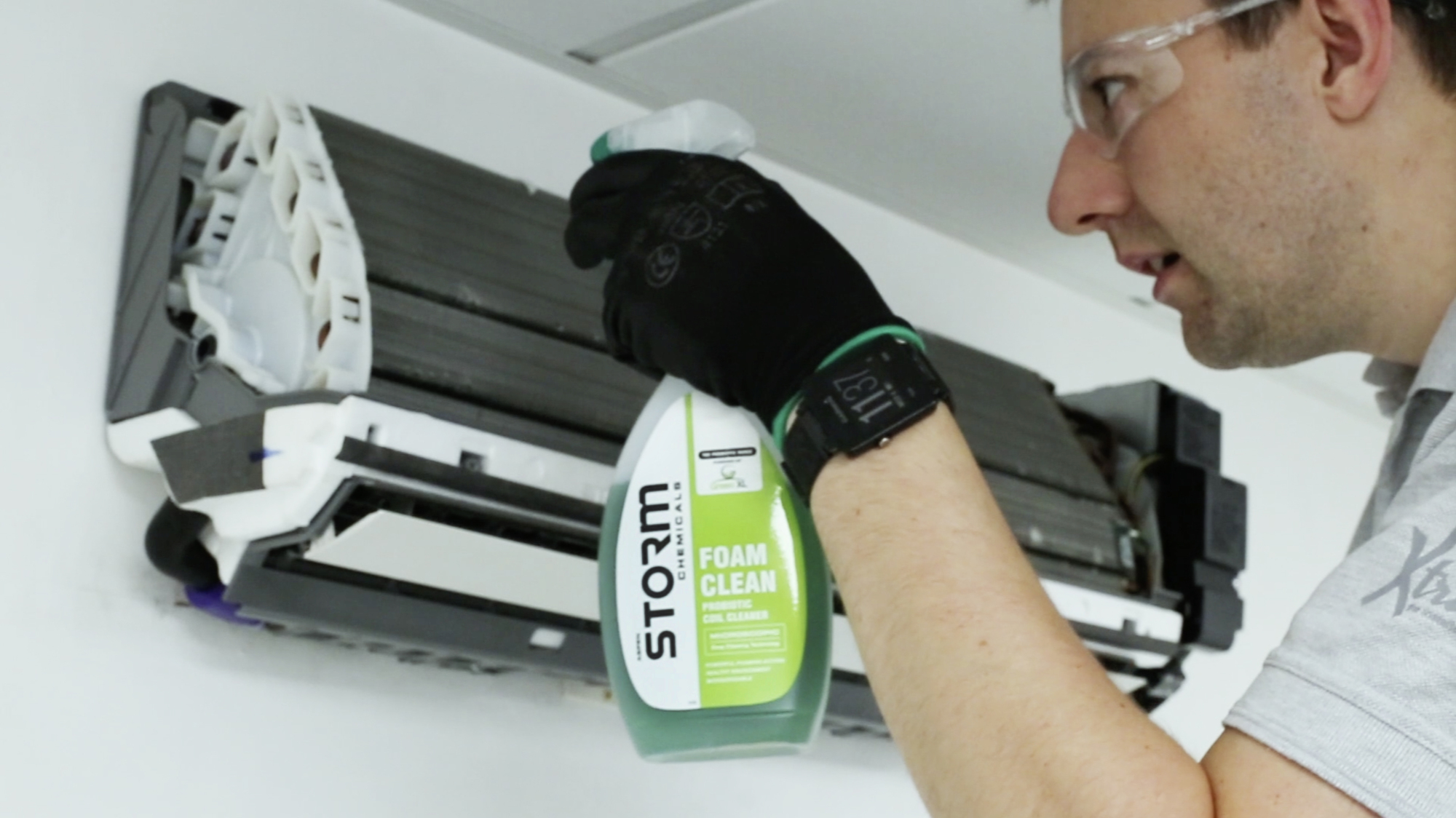Building Services Industry Has Two Years to Fix Indoor Air Quality
A policy paper launched at the Building Engineering Services Association’s World Ventilation Day event suggests there is a “two-year window of...
Read Full Article
For FMs concerned about in indoor air quality and the toxins that go into their buildings, Vern Klein explains how the latest specialist HVAC cleaning chemicals are both effective and non-toxic.
Disinfectants and surface cleaners have traditionally been used to clean HVAC plant but these are either quite toxic, requiring COSHH compliance or ineffective at cleaning below the biofilm.
Health and wellbeing and the effect air quality has on this has been making headlines. The Stoddart Review found that employees’ health and wellbeing has a significant impact on productivity, citing that happy workers are 12% more productive. Key parameters for a healthy and productive workforce include indoor air quality (IAQ), temperature, light and noise levels.
With companies keen to benefit from the advantages of a healthy, happy workforce, how can facilities managers help improve IAQ, and therefore health and wellbeing? One answer is a re-thinking of cleaning HVAC plant which has resulted in the introduction of probiotic cleaning technology, a totally new alternative to conventional cleaning disinfectants.
Even cleaner
So what is probiotic cleaning technology? Intensive R&D has developed a biological product containing billions of positive organisms which leave a healthy microflora on the surface, offering a longer lasting clean. This promotes a healthier indoor environment with probiotic ‘good’ microbes working to combat the build-up of bad bacteria long after the service and maintenance is complete, ensuring a product remains clean in-between service intervals.
Conventional cleaners only clean the surface and other non-aggressive cleaners only mask the biofilm (microscopic layer). Probiotic cleaners are different as they are able to provide deep microscopic cleaning beyond the biofilm, removing both the visible and invisible dirt and eliminating dust, mould, bacteria and other pollution, as well as neutralising bad, musty odours caused by fungi and bacteria.
Growth of resistant bacteria
Intensive use of conventional disinfectant or antibacterial cleaners can actually encourage the growth of highly resistant, harmful micro-organisms. In contrast, probiotic cleaners, such as Storm Chemicals Green XL, do not have the problem of bacterial resistance. They offer an intensive but gentle clean which goes beyond the biofilm and ensures a stable and healthy microbial environment.
Clean and green
Probiotics offer environmental credentials too, making them particularly attractive to FMs working on sustainable and green building applications. Probiotic cleaners are 100% biodegradable, meaning that FMs do not have to worry about COSHH restrictions for transport, use and storage, since they are harmless to people and animals, and environmentally friendly too.
Improved efficiency
Energy efficiency is also high up on the agenda for businesses today, with companies expecting products to be energy efficient. Air conditioning and refrigeration units use more energy than any other building services plant and whilst huge advances have been made to manufacture new, more energy efficient AC units, effective cleaning of existing AC units is essential to energy saving.
To achieve maximum energy saving and comply with energy efficiency legislation, long-term probiotic protection means AC will be cleaner for longer and so work more efficiently. As a result this would improve energy efficiency of AC equipment and result in fewer call backs. This new breed of cleaner can improve energy efficiency of ACR equipment by up to 30%, a significant amount for building owners.
Ticking both boxes
As an environmentally friendly cleaning technology, probiotic cleaners tick all the right boxes. They help ease both health and wellbeing and energy efficiency concerns, as well as extending the time that kit remains clean in between services. Add on the fact that equipment will work more efficiently, resulting in fewer call backs as well as safe to handle and store and probiotic cleaners clearly become the AC equipment cleaner of choice for FMs.
Picture: Green XL Probiotic Cleaner in use
Vern Klein is Head of Business Development – Storm Chemicals at Aspen Pumps
Article written by Brian Shillibeer | Published 08 February 2018
A policy paper launched at the Building Engineering Services Association’s World Ventilation Day event suggests there is a “two-year window of...
Read Full ArticleBuilding and property maintenance company Wates has launched a new “healthy homes” service to help social housing landlords to reduce disrepair,...
Read Full ArticleAn awareness day to promote the impact of humidity control in our daily lives and the buildings we live and work in has launched. The Humidity Control Group, a...
Read Full ArticleNew research shows that asthmatics in Oxford had fewer hospital stays in 2020, largely due to reduced air pollution during the national lockdown. Falling...
Read Full ArticleA consultation has been launched to explore introducing strict time limits for social housing providers to address dangerous hazards such as damp and mould....
Read Full ArticleThe second annual World Ventil8 Day was held on 8 November 2023 to raise awareness of ventilation as a crucial part of human wellbeing. Beginning in 2022, the...
Read Full ArticleInnovative Proptech companies such as LightFi are paving the way to net-zero by helping buildings become more energy efficient whilst promoting occupant health and...
Read Full ArticleThe Building Engineering Services Association (BESA) says it is surprised that changes to pollution laws announced by the government ignore the importance of indoor air...
Read Full ArticleBillionaire entrepreneur Elon Musk has long hinted at a desire to enter the smart HVAC system market, a move that BESA argues will inject a much-needed boost into the...
Read Full ArticleClean Air Day is the UK's largest air pollution campaign, bringing together communities, businesses, schools and the health sector. Watch the...
Read Full Article